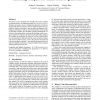Free Online Productivity Tools
i2Speak
i2Symbol
i2OCR
iTex2Img
iWeb2Print
iWeb2Shot
i2Type
iPdf2Split
iPdf2Merge
i2Bopomofo
i2Arabic
i2Style
i2Image
i2PDF
iLatex2Rtf
Sci2ools
111
click to vote
PASTE
2010
ACM
2010
ACM
Extracting compiler provenance from program binaries
We present a novel technique that identifies the source compiler of program binaries, an important element of program provenance. Program provenance answers fundamental questions of malware analysis and software forensics, such as whether programs are generated by similar tool chains; it also can allow development of debugging, performance analysis, and instrumentation tools specific to particular compilers. We formulate compiler identification as a structured learning problem, automatically building models to recognize sequences of binary code generated by particular compilers. We evaluate our techniques on a large set of real-world test binaries, showing that our models identify the source compiler of binary code with over 90% accuracy, even in the presence of interleaved code from multiple compilers. A case study demonstrates the use of inferred compiler provenance to augment stripped binary parsing, reducing parsing errors by 18%. Categories and Subject Descriptors D.3.4 [Progr...
Related Content
| Added | 10 Jul 2010 |
| Updated | 10 Jul 2010 |
| Type | Conference |
| Year | 2010 |
| Where | PASTE |
| Authors | Nathan E. Rosenblum, Barton P. Miller, Xiaojin Zhu |
Comments (0)

